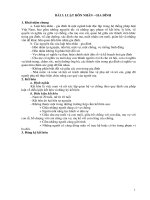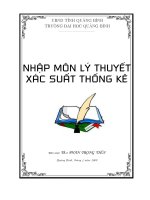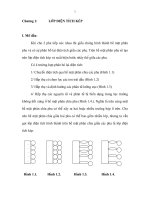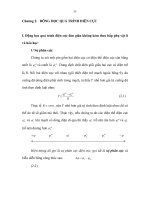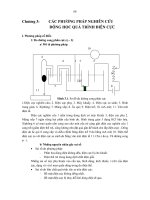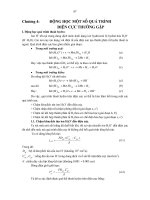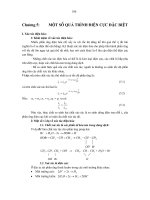CONDITIONAL SENTENCES LY THUYET
Bạn đang xem bản rút gọn của tài liệu. Xem và tải ngay bản đầy đủ của tài liệu tại đây (95.25 KB, 6 trang )
CONDITIONAL SENTENCES
I. CÁC LOẠI CÂU ĐIỀU KIỆN :
1. Type 0:
Câu điều kiện loại 0 dùng để diễn tả thực tế (facts), sự thực (general truths), thói quen
(habits) hoặc sự kiện thường xuyên (common events)
a. [Thực tế – facts] : If you mix blue and red, you get purple.
b. [Sự thực – general truths]: If I ask her to come with us, she always says no.
c. [Thói quen – habit]: If I go to bed early, I always get up very early.
Lưu ý:
Với loại câu điều kiện này, có thể thay “if” bằng “when” hoặc “whenever”
- When you put a paper on fire, it burns quickly.
- He reads book whenever he has free time.
Mệnh đề điều kiên (mệnh đề có If) và mệnh đề kết quả, có thể đảo vị trí cho nhau mà không thay
đổi ý nghĩa của câu.
- If I make a silly mistake, I laugh. I laugh, if I make a silly mistake.
*Form:
If + simple present tense ..., + simple present tense ...
2. Type 1: FUTURE POSSIBLE: Diễn tả một khả năng có thể xảy ra ở hiện tại hoặc tương lai
If S + V ( simple present), S + will/shall/can/may + V ( nguyên thể)
Ex:
If I have time, I will go.
3. Type 2: PRESENT UNREAL: Diễn tả tình huống trái với hiện tại, khơng thể xảy ra ở tương
lai hoặc một sự việc mà người nói khơng nghĩ hoặc không mong sẽ xảy ra.
If + S + V(past subjunctive/ simple past), S + would/ could/
might/should + V
Ex: I don't win a lot of money, so I can't spend most of it travelling round the world.
If I won a lot of money, I could spend most of it travelling round the world. (trái với hiện tại)
If I were you, I would marry him. (Trái với hiện tại và không thể xảy ra ở tương lai.)
If I were a millionaire, I would travel around the world.(Người nói khơng nghĩ là có thể xảy
ra.)
If a buglar broke into my house, I would call the police.(Người nói khơng mong là có thể xảy
ra.)
4. Type 3: PAST UNREAL: Diễn tả tình huống khơng có thật ở q khứ, trái với quá khứ
If + S + had + Vp2 , S + would/ could/ might/should + have + Vp2
Ex:
1
I didn't tell her any good news because I wasn't here early.
→ If I had been here earlier, I would have told her some good news.
5. Type 4: Câu điều kiện pha trộn:
Form 1: Type 3 và Type 2
If + S + had + Vp2, S + would/ could/ might + V
Ex: He isn't a rich man now because he didn't take my advice.
→ If he had taken my advice, he would be a rich man now.
Form 2: Type 2 và Type 3
If + S + V(past subjunctive/ simple past), S + would/ could/ might +
have + Vp2
Ex: If I were him, I wouldn't have got married to her.
II. DẠNG ĐẢO NGỮ CỦA CÂU ĐIỀU KIỆN
1.Đảo ngữ câu điều kiện loại I:
Cấu trúc : Should + S + (not) Vinf, S + Will +Vinf
VD: If he has free time, he’ll play tennis. => Should he have free time, he’ll play tennis
2. Đảo ngữ câu điều kiện loại II:
Cấu trúc:
Were + S +
O/st
(not) to V
S + Would/Could + Vinf
VD:
- If I learnt Russian, I would read a Russian book. => Were I to learn Russian, I would read a
Russian book
- If I were you, I would buy this car. => Were I you, I would buy this car
3. Đảo ngữ câu điều kiện loại III:
Cấu trúc: Had + S + (not) P2/Ved, S + Would have + P2/Ved
VD: If he had trained hard, he would have won the match. => Had he trained hard, he would
have won the match.
If not = Unless (Nếu khơng... thì...)
VD:
- Unless we start at once, we will be late = If we don't start at once, we will be late.
- Unless you study hard, you won't pass the exams = If you don't study hard, you won't pass the
exams.
4. Đảo ngữ của câu điều kiện loại hỗn hợp (Mixed Conditional Sentence)
Đảo ngữ câu loại này giống đảo ngữ vế If của câu điều kiện loại III
Cấu trúc: Had + S + (not)P2/Ved, S + would/could + V
VD: If I hadn't told her about this, she wouldn't be sad now. => Had I not told her about this, she
wouldn't be sad now.
2
III. Một số BIẾN THỂ có thể có của các cụm động từ trong các vế của câu điều kiện:
1. LOẠI I
A. Biến thể của cụm động từ trong mệnh đề chính (main clause):
- Đối với trường hợp muốn nhấn mạnh tính có thể xảy ra sự việc
If + present simple, ... may/might + V-inf.
Ví dụ. If the weather gets worse, the flight may/might be delayed.
- Đối với trường hợp thể hiện sự đồng ý, cho phép, gợi ý
If + present simple, ... may/can + V-inf.
Ví dụ. If it stops raining, we can go out.
- Đối với câu gợi ý, khuyên răn, đề nghị hoặc yêu cầu nhưng nhấn mạnh về hành động
If + present simple, ... would like to/must/have to/should... + V-inf.
Ví dụ. If you go to the library today, I would like to go with you.
If you want to lose weight, you should do some exercise.
- Đối với trường hợp có thể xảy ra trong tương lai và nhấn mạnh trạng thái diễn ra/hoàn
thành của sự việc
If + present simple, future continuous/future perfect.
Ví dụ. If we leave Hanoi for Hue today, we shall be staying in Hue tomorrow.
If you do your home work right now, you will have finished it in 2 hours' time.
- Đối với câu mệnh lệnh (chủ ngữ ẩn ở mệnh đề chính)
If + present simple, (do not) V-inf.
Ví dụ. If you are hungry, go to a restaurant.
If you feel cold, don't open the door.
- Đối với câu khuyên răn, trong trường hợp này không thực sự là một câu điều kiện bởi "if"
mang nghĩa như "as, since, because"
If + present simple, why do (not) + V-inf.
Ví dụ: If you like the movie, why don't you go to the cinema?
B. Biến thể của cụm động từ trong mệnh đề điều kiện (if-clause)
- Đối với trường hợp đang xảy ra ngay trong hiện tại
If + present continuous, simple future.
Ví dụ. If he is working, I won't disturb him.
If you are doing exercises, I shall wait.
If I am playing a nice game, don't put me to bed.(tương đương simple future)
- Đối với trường hợp không chắc về thời gian của điều kiện có thật mà nhấn mạnh tính hồn
tất của nó
If + present perfect, simple future.
Ví dụ. If you have finished your homework, I shall ask for your help.
- Đối với câu gợi ý nhưng nhấn mạnh về điều kiện
If + would like to + V-inf, ... will/can/must/nothing + V-inf.
Ví dụ. If you would like to go to the library today, I can/will go with you.
- Đối với câu đề nghị, gợi ý, bày tỏ ý kiến mang tính lịch sự
If + can/may/must/have to/should/be going to + V-inf, simple future.
Ví dụ. If I can help you, I will.
If I may get into the room now, I shan't feel cold.
If I must/have to take the oral test, I shall feel afraid.
If you are going to go to University, you must study hard before an entrance examination.
If you should see her tomorrow, please tell her to phone me at once. (tương đương probably)
3
Lưu ý: Trong câu "if + subject + should + V-inf.", should có thể được đưa lên đầu câu thay
"if"
Should + V-inf., simple future.
Ví dụ. Should you see him on the way home from work, please tell him to call on me
Tương tự như vậy, ta có một số biến thể ít phổ biến hơn của cụm động từ đối với GIẢ ĐỊNH
KHƠNG CĨ THỰC (unreal conditions loại II và III), tuỳ vào việc muốn nhấn mạnh và trạng thái
diễn tiến hay hoàn thành của sự việc trong mệnh đề điều kiện hoặc sự việc trong mệnh đề chính.
2. LOẠI II
A. Mệnh đề chính (main clause)
- If + past simple, ... would/should/could/might/had to/ought to + be V-ing.
Ví dụ. If we left Hanoi for Hue this morning, we would be staying in Hue tomorrow.
- If + past simple, past simple. (việc đã xảy ra)
Ví dụ. If the goalkeeper didn't catch the ball, they lost.
- If + past simple, ... would be + V-ing.
Ví dụ. If I were on holiday with him, I would/might be touring Italy now.
- If dùng như "as, since, because" có thể kết hợp với động từ ở nhiều thì khác nhau trong mệnh đề
chính và khơng thực sự là một câu điều kiện.
Ví dụ. If you knew her troubles, why didn't you tell me?
B. Mệnh đề phụ (if-clause)
- If + past continuous, ... would/could + V-inf.
Ví dụ. If we were studying English in London now, we could speak English much better.
3. LOẠI III
A. Mệnh đề chính (main clause)
- If + past perfect, ... could/might + present perfect.
Ví dụ. If we had found him earlier, we could have saved his life.
- If + past perfect, present perfect continuous.
Ví dụ. If you had left Hanoi for Haiphong last Saturday, you would have been swimming in
Doson last Sunday.
B. Mệnh đề phụ (if-clause)
- If + past perfect continuous, ... would + present perfect.
Ví dụ. If it hadn't been raining the whole week, I would have finished the laundry
Đối với trường hợp "if" được sử dụng như một liên từ dùng để bắt đầu một mệnh đề phụ trạng
ngữ chỉ điều kiện về thời gian, lúc này "if = when". Vậy "if" và "when" khác nhau thế nào?
- WHEN: được dùng khi diễn tả một điều gì đó chắc chắn xảy ra.
Ví dụ. I am going to do some shopping today. When I go shopping, I'll buy you some coffee.
- IF: được dùng khi diễn tả một điều khơng chắc chắn (có thể hoặc khơng thể) xảy ra trong tương
lai.
Ví dụ. I may go shopping today. If I go shopping, I'll buy you some coffee.
Lưu ý: Động từ chính trong mệnh đề phụ trạng ngữ bắt đầu bằng "when" hoặc "if" luôn ở thì
present simple mặc dù hành động sẽ xảy ra trong tương lai.
Ví dụ: When/If he arrives tomorrow, I'll tell him about it
4
IV. Những cách thể hiện khác của câu điều kiện:
1. But for/Without/Had it not been for/if it weren't for + noun: Nếu khơng có/Nếu khơng vì…
Ví dụ:
- But for your daily help, I couldn’t finish my work.
- Without her encouragement, he wouldn’t have succeeded.
- If it weren’t for you, I wouldn’t know what to do.
If he had n’t got my book, he couldn’t have written well the thesis.
-> But for my book, he couldn’t have written well the thesis.
- If they hadn’t helped me, I wouldn’t have finished that work.
> Without their help, I wouldn’t have finished that work.
- It rained and we had to cancel the match.
-> Had it not been for the rain, we wouldn’t have cancelled the match.
* Had it not been for: Chỉ dùng với câu điều kiện loại 3
* If it weren’t for: Chỉ dùng với câu điều kiện loại 2
2. Unless = If ….. not:
Ví dụ:
- Unless we start at once, we will be late = If we don’t start at once we will be late.
- Unless you study hard, you won’t pass the exams = If you don’t study hard, you won’t pass the
exams.
- Mệnh đề sau “unless” thì phải trái nghĩa với mệnh đề sau “if”
Eg: You can’t go to university if you don’t have good grades.
Nếu bạn muốn dùng unless, bạn phải đổi lại là:
You can’t go to university unless you have good grades.
- Mệnh đề “Unless” luôn luôn ở thể khẳng định.
3. Provided (that)/Providing (that)/So long as/As long as/On condition that: Miễn là, Với điều
kiện là…
Lưu ý rằng provided (that) / providing (that) mang tính trang trọng hơn là as long as / so long
as, còn on condition that mang tính dứt khốt và trang trọng hơn cả.
- We will lend you the money on condition that it is repaid within 12 months.
- We will lend you the money provided (that) you can repay it within 12 months.
- I don’t mind talking to the press, but only if my identity is protected.
- You can have the day off today providing (that) you agree to work a double shift tomorrow.
- You can borrow my DVD player as long as you return it on Monday.
4. Even if: Ngay cả nếu
- Even if I become a billionare, I will still be working.
5. What if: Nếu như….thì sao?
5
- What if John told Mary my secrets?
6. Assuming (that)/ Suppose/ Supposing (that): Giả sử rằng…
- Supposing that we miss the train, what shall we do?
- Assuming that the earth were flat, what would happened?
6
